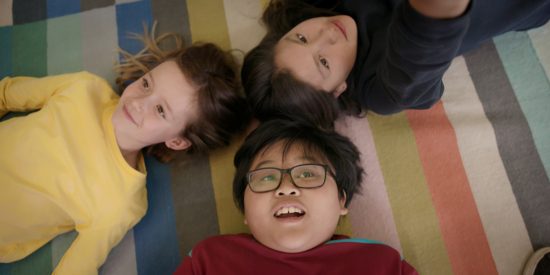TIFF 2021 Review: Scarborough – “An important lesson in empathy and kindness”

Image Courtesy of TIFF
Scarborough, Ontario is an eastern suburb of Toronto. A true melting pot of diversity, not only in cultural backgrounds, but socioeconomic ones too. It’s also where this film critic was born and raised. I lived the first 19 years of my life in Scarborough before I went off to university, and live now even closer to where this film’s main story takes place. So I had a sense of affectionate connection walking into directors Sasha Nakhai and Rich Williamsom‘s feature debut. Based on the book by Catherine Hernandez, who also adapted her work for the screen, Scarborough is a film full of heart, empathy, hope, and community.
The film follows the intersecting stories of three families, each of different backgrounds, but each with their own immense struggles. Sylvie (Essence Fox) is a young, strong, independent Indigenous girl whose family, including her autistic brother, struggles to find a permanent home and is currently living in a family residence shelter. Bing (Liam Diaz) is a young, artistic, gifted Filipino boy whom we meet as his mother races to get them out a home full of abuse from his mentally ill father. Laura (Anna Claire Beitel) is abused and neglected by her drug addicted mother before she is abandoned and released to the care of her ill-prepared father, a man with anger issues who only furthers her trauma.
The three children meet and bond at the Ontario Reads program, a social place that inspires community literacy. It’s run by a warm and empathetic teacher, Ms. Hina (Aliya Kanani) who forms personal connections with each student and their parent. This is despite warnings from her boss who, from her place of privilege and wielding her Masters degree as a weapon of superiority, chooses not to truly understand the community’s needs. Sylvie, Bing, and Laura are fast friends and, inspired by Ms. Hina and by each other, grow despite their setbacks and own personal traumas. Their families struggle under the weight of burdens most of us can never fathom, but told over the course of a year, these children’s stories share hope and heartache in equal measure.
Directors Nakhai and Williamson employ techniques from their filmmaking history as documentarians to make Scarborough feel authentic and raw. It also creates intimacy with the characters. And while the parents have important parts in the film, its success lay directly with these child actors, who always feel natural in their roles. It’s impossible not to root for these children to succeed, for them to break free from this system that makes every hill a mountain to climb. There are many issues that Hernandez’s story brings to light – from obstacles within the medical system, lack of housing initiatives, resources, and transportation. But perhaps one of the biggest problems that underlies the others, a lack of empathy, is something these children can change.
As Hernandez said while introducing the film, there are Scarboroughs everywhere. Each city has its forgotten corner, where racism and classism intersect. Where the rest of the city largely turns a blind eye and the governmental agencies in charge lack forethought and development in programs and infrastructure that could make a difference. Where the working class, in this case the nail salon employee and the factory workers, make decisions every day that impact their survival. This is where community learns to take care of itself. Where a community shares its grief, but also celebrates its triumphs, some big, some small. Scarborough is an honest depiction of those families so often ignored on screen, as in real life. It’s often heartbreaking, in places harrowing, and an important lesson in empathy and kindness, no matter where your Scarborough may be.










